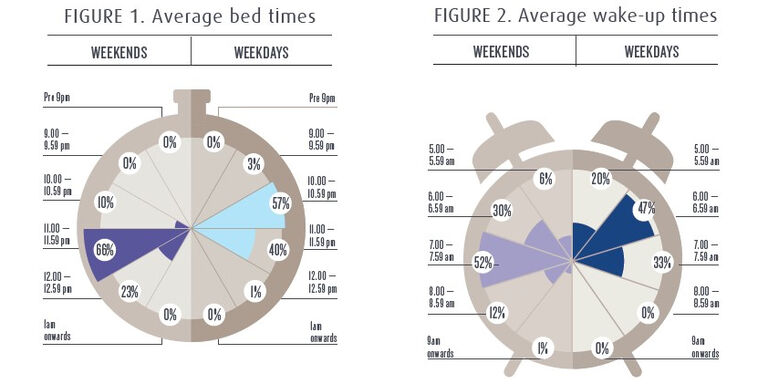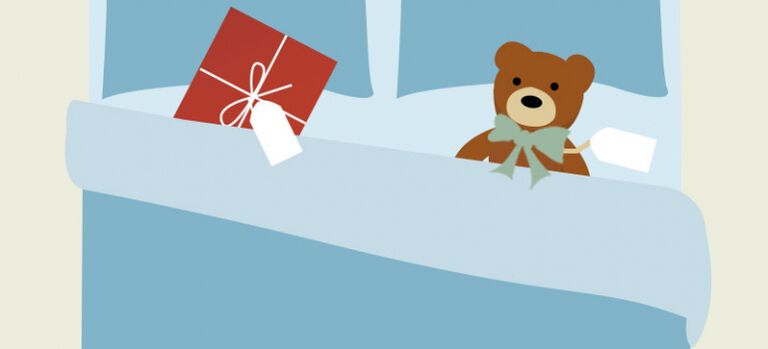WHAT IS THE BEST TIME TO SLEEP?

Most people understand that the sleep they get at night affects the way they feel during the day. Anyone who has had a bad night’s sleep – whether through lack of sleep, too much sleep or too little sleep – will typically feel the negative effects the following day.
That may mean feeling groggy, or it could mean feeling heavy-limbed, with a pronounced lack of energy. This absence of energy and inability to concentrate can last throughout the day, greatly affecting productivity at work.
In fact, according to TEMPUR’s 2016 sleep survey, 48% of respondents said a bad night’s sleep severely affected their productivity at work, while 38% said bad sleep severely affected their ability of focus on a task.
So, for anyone who wants to make the most of their day, it becomes important to get a good night’s sleep. This means ensuring comfort while sleeping, while also getting the right amount of sleep and going to bed at the right time.
Starting with amount of sleep needed, The National Sleep Foundation in the United States recommends adults get between seven to nine hours’ sleep each night, while older adults aged 65 and over need around seven to eight hours’ sleep.
However, the best time to get that sleep will vary depending on each sleeper’s age and their resulting circadian rhythm. Circadian rhythms influence sleep/wake cycles, affecting everything we do, by telling us when it’s best to sleep, eat, work and exercise.
Responding to these circadian rhythms, our brain reacts to exposure to light in the morning by slowly releasing cortisol, readying our body to wake up, providing us with energy that decreases throughout the day. In the evening, as light fades, melatonin levels rise, making us feel sleepy. Through the night, melatonin levels remain high, allowing us to stay asleep to get a full night’s rest.
THE IMPORTANCE OF SLEEP CYCLES
When talking about getting a good night’s rest, it’s important to understand the various stages of sleep within our sleep cycle. Experts believe a night’s sleep is broken up into 90-minute sleep cycles, varying between ‘light’ sleep and ‘deep’ sleep.
During each 90-minute cycle, our brain moves from deep, non-rapid eye movement (non-REM) sleep to REM sleep. While the 90-minute cycle remains fairly stable throughout the night, it’s believed the ratio of non-REM to REM sleep changes.
Non-REM sleep dominates each sleep cycle during the early part of the night, while REM sleep takes over towards daybreak. Why does this matter? Non-REM sleep is thought to be deeper and more restorative than lighter, dream-infused REM sleep.
But, non-REM sleep tends to occur early on in the night, no matter what time you go to bed. So, if you go to bed at 2am, your body will miss out on much of that important, restorative non-REM sleep, even if you do get your recommended eight hours’ rest.
WHAT IS THE BEST TIME TO GO TO BED?
The best time to go to bed often depends on age – and whether the sleeper is a ‘night owl’ or an ‘early bird’.
Research from the Insomnia & Behavioural Sleep Medicine Program at Stanford University has shown that night owls who force themselves to go to bed early, and early birds who try to stay up late are going against their physiology.
As for age, while small children tend to be most tired in the early evening, college-aged adults tend to go to bed around or after midnight. Then throughout their thirties, forties, fifties and beyond, that bedtime creeps earlier and earlier.
WHAT IS THE BEST TIME TO WAKE UP?
For many, finding the optimal bedtime means thinking about what time they need to wake up. Changes in sleepers’ circadian rhythms means as they get older, the melatonin in their bodies starts to decrease, so they wake up earlier and earlier.
According to a study from Paul Kelley and Oxford University, the ideal wakeup time for sleepers in their twenties is 9.30 am, in their thirties it’s 8 am, in their forties it’s 7:30 am, in their fifties it’s 7 am, and in their sixties it’s 6:30 am.
It makes sense that if we want to get our full seven to nine hours of sleep, we will need to adjust our bedtime to match our wakeup time.
As for productivity, it’s worth bearing in mind the results of TEMPUR’s sleep study research. It showed 15% of respondents with a bedtime after 11pm were often tired at work; while 6% with a pre-6am wakeup time, 10% with a wakeup time between 6am and 7am, and 29% with a wakeup time after 7am said their wakeup time affected their tiredness at work.
So, in order to get the best night’s sleep, it’s essential to listen to what the body is saying, while learning to understand circadian rhythms. It’s also important to pay attention to changes as the years go by, while getting the most from each sleep cycle with an unchanging sleep and wakeup time throughout the week.
Feel it for yourself
Find a TEMPUR store or Stockist and try out our range of mattresses for yourself

SIGN UP FOR THE NEWSLETTERS!
By signing up, you agree to receive TEMPUR Australia’s products, services, news, reviews and promotions by emails. For more information on how we process your personal data, please refer to our Privacy Policy.



